|


by Kevin McClure
Fortean Times, July 2003
from
EyePod Website
|
Kevin
McClure wrote The Fortean Times Book of the
Millennium (1996), predicting that nothing of
interest would happen. His initial investigation of the
Nazi UFO mythos appeared in Fortean Studies 7.
He edited Abduction Watch and has written for FT,
Magonia, Fate and others. He is currently collecting
evidence of the manipulative presence of neo-nazi and
racist influences in the field. In real life, he works
for the government. |
It’s much easier to dismiss an absurd claim that is fresh and new
than one which has been around for a while and taken root.
Dislodging established and much-repeated nonsense is much more
difficult, but that doesn’t mean we shouldn’t try. And in
cases where such nonsense tends to exaggerate or glorify the
activities of the Nazis during World War II, I think we should
try particularly hard. In that spirit of endeavour, let’s see what
we can do about the very untrue story of Viktor Schauberger
– builder of flying saucers. The detailed and ever-growing fiction
of the Nazi UFO mythos tells us that the Nazis were so
technically, creatively and scientifically brilliant that, had the
war only lasted a few months longer, they would have won it by
using their amazing flying saucers, which were so very nearly ready
for combat when the Allied forces entered
Czechoslovakia and Southern Germany.
There are two hurdles the mythos has always fought to overcome.
Firstly, that there is no historical record that the
characters said to have been involved in saucer development –
figures like Schriever, Belluzzo, Habermohl, Miethe and
Kleinever – had anything to with the development of ‘flying discs’.
Only Guiseppe Belluzzo has any verifiable scientific
background at all; Schriever was a delivery driver, and it is
unclear whether Habermohl and Miethe even so much as
existed as identifiable individuals.
Secondly, there is
no historical evidence – physical or photographic
– of the supposed flying discs. We are repeatedly told
of craft of immense power, and sometimes immense size, defying all
scientific parameters known before or since. Yet not
so much as a bolt or a tachyon drive remains to verify their
existence. There are just the oft-reproduced, fuzzy post-war
photos taken by those who wished to convince us of saucer reality,
but who usually succeeded only in demonstrating the
unexplored potential of domestic containers and the art of close-up
photography.
The mythos argument is that rather than being extraterrestrial in
origin, the discs photographed between 1947 and 1955
were actually developed from captured Nazi blueprints, by captured
Nazi scientists. Relocated to America, they chose to
have their miracle craft chug unimpressively around the dusty back
roads of the USA, sometimes landing, sometimes
crashing, and sometimes – particularly the very small discs –
utilizing conveniently-placed string to hang from trees,
swinging gently and photogenically in the wind. Not one claim of
flying Nazi discs pre-dates 1949 and the increased US
media interest in reports of flying saucers.
Enter Schauberger
Once upon a time, in Austria, there was a forester called Viktor Schauberger. He lived from 1885 to 1958, and in
his long life he devised and worked on a variety of inventions. He
had a keen and original interest in the motion and motive
potential of
 water, and the most notable of his achievements were in
the design and development of log flotation methods
and flumes in the 1920s. Thereafter, he seems to have tried to
develop his ideas towards turbines and cheap natural
power and energy. There is little evidence that any of these later
ideas ever reached fruition, and although his son and
grandson have continued with some more theoretical aspects of his
work, it seems that no repeatable demonstration of Schauberger’s supposed flight technology has ever taken place. water, and the most notable of his achievements were in
the design and development of log flotation methods
and flumes in the 1920s. Thereafter, he seems to have tried to
develop his ideas towards turbines and cheap natural
power and energy. There is little evidence that any of these later
ideas ever reached fruition, and although his son and
grandson have continued with some more theoretical aspects of his
work, it seems that no repeatable demonstration of Schauberger’s supposed flight technology has ever taken place.
For those who want to further the cause of secret Nazi science, or
to maintain the flying saucer mystery, or both, Viktor
Schauberger (image left) has been a prayer answered. Not because he actually
built flying discs for the Nazis, but because some
round, bulbous inventions he probably worked on were photographed
and, with a bit of airbrushing to add Luftwaffe
insignia, they looked rather like the round, bulbous inventions that
figured in 1950s ufology. That he left no physical or
technical evidence of his supposed disc experiments, was at times
somewhat confused about the facts (there is evidence
that he spent some time in a psychiatric hospital), and kept a diary
in a shorthand that was difficult even for his family to
comprehend, could only help. He even had a long, impressive beard to
suggest that he was a misunderstood genius.
History was ripe for rewriting – and not just the once.
The ‘Nazi UFO’ mythos has itself had three distinct phases of life,
with long fallow periods between. The first was in the
early 1950s, when a few individuals, none of them connected with any
post-war rocket or aviation programme in Russia,
the
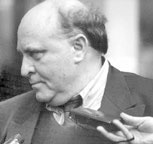 USA or anywhere else, claimed to be at least partly responsible
for the saucer sightings of the period. Schauberger –
still alive at the time – didn’t get a mention at that stage, and
made no claim of his own. USA or anywhere else, claimed to be at least partly responsible
for the saucer sightings of the period. Schauberger –
still alive at the time – didn’t get a mention at that stage, and
made no claim of his own.
Then, around 1975, Canadian Ernst Zundel
(image right), also known as Christof
Friedrich and notorious for his pro-active and well-publicized
skepticism about the reality of the Holocaust, published
(as Mattern Friedrich) the book UFO – Nazi Secret
Weapon? Amid questions like “Is Hitler Still Alive?” and “Did the
Nazis have the Atom Bomb?” he set out a range of wild
speculations about lost Nazi technology and, for the first time to
my knowledge, introduced a number of the key elements
concerning Schauberger’s supposed involvement. Zundel writes:
“Schauberger did experiments early in 1940-41 in Vienna
and his 10 foot (3m) diameter models were so successful that on the
very first tests they took off vertically at such
surprising speeds that one model shot through the 24-foot (7.3m)
high hangar ceiling. After this ‘success’, Schauberger’s
experiments received ‘Vordringlichkeitsstufe’ – high priority – and
he was given funds and facilities as well as help. His
aides included Czech engineers who worked at the concentration camp
at Mauthausen on some parts of the Schauberger
flying saucers. It is largely through these people that the story
leaked out.”
Zundel also provided an account of
Schauberger’s later history and
death. Although Schauberger actually died at home in
1958, Zundel’s version has it that:
“Viktor Schauberger lived for
some years in the United States after the war where he
was reported to be working on UFO projects. His articles were
greatly discussed and then one day in Chicago he just
vanished. His battered body was found and as to who killed
Schauberger or why has never been discovered. One version has it
that gangsters tried to beat his revolutionizing secrets out
of him and accidentally killed him.”
Zundel published the first drawings of what he referred to as the
‘electro-magnetically-powered Flying Hats’.
In the next year, 1976, a biography of sorts appeared (Living Water,
Gateway Books, 1997), written by Olof
Alexandersson, a Swedish ‘electrical engineer and archive
conservationist’. While admitting that “the information for the
basis of this book is fragile”, he managed, from unlisted sources,
to add substantially to the mythos:
“After a while Schauberger received his call-up. It was now 1943, and even older
men were being drafted. He was eventually appointed
the commandant of a parachute company in Italy, but after a short
stay, orders came from Himmler that he should present
himself at the SS college at Vienna-Rosenhugel. When he arrived, he
was taken to the concentration camp at
Mauthausen, where he was to contact the SS standartenführer Zeireis,
who told him he had a personal greeting from Himmler.
‘We have considered your scientific research and think
there is something in it. You can now either choose to
take charge of a scientific team of technicians and physicists from
among the prisoners, to develop machines utilizing the
energy you have discovered, or you will be hanged.’
Schauberger understandably chose the first option (insisting that
his helpers must no longer be regarded as prisoners)
and so an intensive period of study began. After the SS college,
where the research was taking place, was bombed, Schauberger and his team were transferred to Leonstein, near Linz.
The project they initiated there was a ‘flying saucer’
powered by a ‘trout turbine’.
The results of the research were surprising: it was both a success
and a failure. Schauberger later explained this briefly in
a letter to the West German defense minister Strauss on 28 February
1956:
“The first ‘flying saucer’ rose unexpectedly, at
the first attempt, to the ceiling, and then was wrecked.”
Alexandersson offered slightly different pictures of the ‘flying
hats’, probably just removing the Luftwaffe insignia Zundel
had added, and reproduced drawings of other absurd imaginary wartime
UFOs copied directly from Zundel.
Since then, architect Callum Coats has published a series of books
reflecting a persistent interest in Schauberger’s
theories about water and implosion. In 1996 (Living Energies,
Gateway, 2001), he published what appear to be actual
photos of the ‘flying hats’, as well as reprinting earlier drawings,
telling us that:
“Despite its compact size, this machine
generated such a powerful levitational force that when it was first
switched on (without Viktor Schauberger’s permission and
in his absence!), it sheared the six quarter-inch [6mm] diameter
high-tensile steel anchor bolts and shot upwards to smash
against the roof of the hangar.”
Coats also quotes one ‘A Khammas’, writing in the undated Issue 93
of Implosion magazine:
“There are many rumours
about what Schauberger was actually doing during this period, most
of which suggest he was in charge of developing
‘flying discs’ under contract to the army. It later became known
that the ‘flying disc’ launched in Prague on the 19 February
1945, which rose to an altitude of 15,000 meters [50,000ft] in three
minutes and attained a forward speed of 2,200 kph
[1,370 mph], was a development of the prototype he built at
Mauthausen concentration camp. Schauberger wrote,
‘I only
first heard of this event after the war through one of the
technicians who had worked with me’.
In a letter to a friend, dated
the 2 August 1956, Schauberger commented,
‘The machine was supposed
to have been destroyed just before the end of
the war on Keitel’s orders.’”
The tale is a fantasy taken from Rudolf Lusar’s
German Secret
Weapons of the Second World War (1957). Perhaps it is
significant that while we are told that Schauberger twice
effectively rewrote the book on aviation technology, we are also
told that he was both absent from the demonstrations, and unaware
that they had taken place.
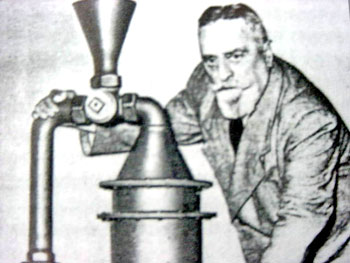
Viktor Schauberger
shown holding his implosion device,
which is claimed to
be the basis for some Nazi Antigravity research.
The most recent phase of belief in the
Nazi UFO mythos began in the
last six years. Susan Michaels, in Sightings: UFOs
(Fireside, 1997), reproduces a range of palpable fictions from
unreliable sources, and introduces some freshly-minted
nonsense. Possibly becoming confused by inconsistent, fictional
accounts of a meeting with Hitler in 1933, she says:
“Also
in 1939, German physicist Victor Schauberger developed a design for
a flying saucer using energy he claimed could be
harnessed from the tonal vibrations, or ‘harmonics’, of the cosmos.
As far-fetched as this theory seems, Schauberger’s
research attracted the attention of Adolf Hitler, who offered to
provide funds to build Schauberger’s own anti-gravity
saucer. But Schauberger, who was a deeply committed pacifist, turned
Hitler down.”
The following year, UK aviation writer and photographer
Bill Rose
wrote an article (“UFO sightings – Why you can blame
Adolf Hitler”) in the popular science magazine Focus (October 1998).
After, apparently, four years of research, he
concluded that:
“The father of the German disc programme was
Rudolph Schriever, a Luftwaffe aeronautical engineer
assigned to Heinkel in 1940... a full-sized piloted version, the V2,
first flew in 1943 with Schriever at the controls. Thirty feet
[9m] in diameter, the V2 had a fixed central cabin around which a
ring with adjustable vanes rotated to provide thrust in
both the horizontal and vertical planes... Early in 1944,
Schriever’s top-secret programme was moved to Czechoslovakia...
Schriever was joined by a number of leading aeronautical
engineers... Another addition was the Austrian scientist Viktor
Schauberger, who just before his death in 1958, claimed to have
worked on a highly classified US disc programme in
Texas.”
Rose seems to be the first to have suggested that
Schauberger
actually worked together with the four other ‘engineers’
who, according to the mythos, built flying saucers, but even Rose’s
remarkable ‘sources’ pale in comparison to those
apparently available to Gary Hyland, author of Blue Fires (Headline,
2001), who says of Schauberger:
“The first test-flight
of the machine was reportedly amazingly successful (it apparently
shot through the roof of the laboratory and had to be
recovered some distance away)... [Schauberger] developed his ideas
further, to the point where a full-sized, though
unmanned flying disc prototype that used his new engine apparently
flew under radio control... At the end of the war, the
American forces got to Leonstein ahead of the Russians and found
Schauberger and his team of experts. After letting the
members of his team leave after a thorough interrogation, the
Americans held Schauberger in protective custody for six
months; it would seem that they knew exactly what he had been up to
and wanted to prevent other nations, as well as
renegade Nazis, from continuing to use his services”.
The Cook Report
Exceeding even the rich imaginations of Michaels, Rose and
Hyland is
the much-publicized book
The Hunt for Zero Point
(Century, 2001) by
Nick Cook, a notable freelance aviation
journalist who has written for the very respectable
Jane’s
Defence
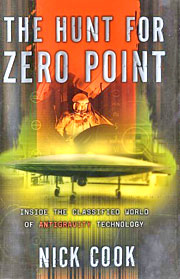 Weekly. In the course of an investigation lasting, we are
told, some 10 years, he appears to have been
comprehensively misinformed by a whole series of individuals; or
perhaps by individuals acting on behalf of a group with a
specific agenda. It seems that for all the informants he gathered
along the way, none of them ever warned Cook that
people with an investment in making the Nazi regime (and the SS in
particular) look good are quite happy to use deception
to do so. Weekly. In the course of an investigation lasting, we are
told, some 10 years, he appears to have been
comprehensively misinformed by a whole series of individuals; or
perhaps by individuals acting on behalf of a group with a
specific agenda. It seems that for all the informants he gathered
along the way, none of them ever warned Cook that
people with an investment in making the Nazi regime (and the SS in
particular) look good are quite happy to use deception
to do so.
Without going through Cook’s oddly directionless book in any detail,
it’s worth noting that his primary source about Schauberger was a Polish gentleman named
Igor Witkowski. Witkowski,
apparently, volunteered to drive Cook around,
showing him sites where Schauberger had worked for the Nazis,
constructing and testing ‘The Bell’, an experimental device
with two cylinders spinning in opposite directions. Cook was told
that this glowed blue and destroyed plants, birds, animals,
and sometimes humans. Internet searches for Witkowski bring him up
in conjunction with the loopy, ‘1930s-crashed-saucer-
back-engineered-by-the-SS’ end of Polish ufology, and he has
self-published six or more separate items with titles like Hitler’s Supersecret Weapon.
Witkowski told Cook that his extraordinary information came from an
unnamable source, which Cook seems to have
accepted without question. It seems that a “Polish government
official” phoned Witkowski, inviting him to view documents
and take notes about the development and concealment of
extraordinary Nazi technology as given in a record of “the
activities of a special unit of the Soviet secret intelligence
service.” Witkowski’s evidence, together with a visit to Schauberger’s grandson, leads
Cook to reproduce the material about
imprisonment by the US after the war, and the
apartment being blown up by the Russians, together with various
unlikely claims about Schauberger being offered massive
sums of money by (right-wing) Americans in the years before he died.
Cook also informs us that Schauberger’s designs
had been stolen by Heinkel in the early part of the war; that he had
worked on secret projects for the Nazis from 1941-45,
sometimes using slave labour; that he had created, specifically for
the SS, disc-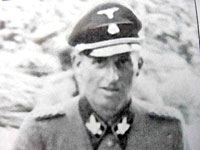 shaped machines with engines so
revolutionary that even Cook, an aviation journalist, fails to
explain how they worked. shaped machines with engines so
revolutionary that even Cook, an aviation journalist, fails to
explain how they worked.
One of the problems faced by the Nazi ufologists is to explain the
complete absence of palpable evidence. Cook chooses
to adopt SS General Hans Kammler (image
right) for this purpose. Kammler used
concentration camp labour to build the Atlantic Wall,
contributed to the construction of the Auschwitz gas chambers, and
was in charge of the V2 missile programme, which
again ruthlessly exploited slave labour. He is also, it seems, the
person who spirited away all traces of Schauberger’s
astonishing technical achievements, allegedly to his own advantage
by way of trade with the approaching Allies. However,
the earliest version I have found of this story dates from 1989, put
about by Nevada Aerial Research, who have done much
to publicize the supposed wonders of Nazi technology (and they later
came up with the most unpleasant of the tales of
dominant and brutal alien beings living below the US air base at
Dulce). I do not believe that their account of
Kammler had
any existence prior to 1989, or that it is true.
There is no period of history more thoroughly examined than
1939-1945, and no subject more closely examined than the
Nazis, and more particularly, the SS. Had there been any reality in
the claims for the construction and testing (or more) of
high-speed flying disc technology by the Third Reich during that
period, then we would have every reason to expect that it
would have been discovered, reported, and analyzed by writers and
researchers far more competent than those referred
to above. Yet it never has been.
Nonetheless, there is a recurrent and developing counter-cultural
argument that insists these extraordinary events actually
took place. It is a theory that has sold millions of books and
videos, and it continues to fuel a belief that, given just a few
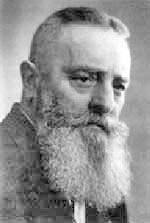 more months, the true genius of the Nazis, the fanaticism of the SS,
and the inspiration of the Führer would have won
through, and the Allies – no, not just the Soviet Union, but all the
Allies – would have been defeated. more months, the true genius of the Nazis, the fanaticism of the SS,
and the inspiration of the Führer would have won
through, and the Allies – no, not just the Soviet Union, but all the
Allies – would have been defeated.
While I’m happy to be challenged by solid evidence, I’ve found no
reason to believe that Viktor Schauberger
(left) knew anything
of this. I think he died before it was made up. He never built a
flying disc, let alone one that flew using some unknown and
unprecedented method of propulsion. He wasn’t sought out by Hitler
or the SS, didn’t choose slave workers from Mauthausen to assist him, and wasn’t held by the Americans after the
war because of his technical knowledge and
achievements. If the Russians burned his flat down, I doubt that
they even knew whose flat it was. The only truth seems to
be that he visited the USA in the 1950s, leaving behind him
components of two experimental water turbines; the objects
that Zundel (who adorned them with Nazi insignia) said flew.
I
have been told, all too often, not to use the term ‘Nazi UFOs’,
because this is really about secret and suppressed
technology. It just happens that the Germans were clever enough to
invent it, and even if Ernst
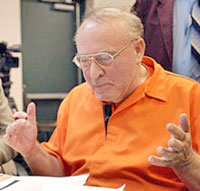 Zundel
(image right) manufactured or
exaggerated some of the facts, then he only did it for the money. Zundel
(image right) manufactured or
exaggerated some of the facts, then he only did it for the money.
On ‘The Zundelsite’, in the ‘Zundelsite Zgram’ for 26 December 1998,
the matter is explained in his own words. He says of
his publications and his radio appearances:
“I realized I had
discovered a potent publicity tool with this topic – which would
get me lots of free time on radio and TV shows, to expose other,
more ‘politically incorrect’ topics to vast audiences... I
slipped in lots and lots of ‘Revisions of History’... I talked about
the disinfecting procedures to protect the valuable worker
inmates in the Dora-Mittelwerke rocket underground assembly
factories...
I mentioned the medical facilities in the camps,
the calorie count of the meals served, etc... The UFO books
themselves also had very important politically otherwise
impossible-to-tell messages embedded within them, such as the
National-Socialist Party program and Hitler’s analysis of
the Jewish question... All that – and I made a fine bundle of money!
The money I made from the UFO books I invested in
publishing the booklets Die Auschwitz-Luge - a translation of
The
Auschwitz Lie, Dr Austin App’s booklet The Six Million
Swindle and A Straight Look at the Third Reich; and, of course,
later, Did Six Million Really Die? by Richard Harwood.”
If Zundel’s own account is to be believed – and I think it probably
is – then his fictions about Nazi UFOs have funded the
distribution of Holocaust revisionist material around a substantial
part of the world. So, at the end of the day, there’s more
at stake here than just tall tales and technological fantasies;
there would appear to be a good ethical argument to stop
repeating such fictions and to put the ‘Nazi UFO’ mythos to
rest
once and for all.
|

 water, and the most notable of his achievements were in
the design and development of log flotation methods
and flumes in the 1920s. Thereafter, he seems to have tried to
develop his ideas towards turbines and cheap natural
power and energy. There is little evidence that any of these later
ideas ever reached fruition, and although his son and
grandson have continued with some more theoretical aspects of his
work, it seems that no repeatable demonstration of Schauberger’s supposed flight technology has ever taken place.
water, and the most notable of his achievements were in
the design and development of log flotation methods
and flumes in the 1920s. Thereafter, he seems to have tried to
develop his ideas towards turbines and cheap natural
power and energy. There is little evidence that any of these later
ideas ever reached fruition, and although his son and
grandson have continued with some more theoretical aspects of his
work, it seems that no repeatable demonstration of Schauberger’s supposed flight technology has ever taken place. USA or anywhere else, claimed to be at least partly responsible
for the saucer sightings of the period. Schauberger –
still alive at the time – didn’t get a mention at that stage, and
made no claim of his own.
USA or anywhere else, claimed to be at least partly responsible
for the saucer sightings of the period. Schauberger –
still alive at the time – didn’t get a mention at that stage, and
made no claim of his own.
 Weekly
Weekly
 more months, the true genius of the Nazis, the fanaticism of the SS,
and the inspiration of the Führer would have won
through, and the Allies – no, not just the Soviet Union, but all the
Allies – would have been defeated.
more months, the true genius of the Nazis, the fanaticism of the SS,
and the inspiration of the Führer would have won
through, and the Allies – no, not just the Soviet Union, but all the
Allies – would have been defeated. Zundel
(image right) manufactured or
exaggerated some of the facts, then he only did it for the money.
Zundel
(image right) manufactured or
exaggerated some of the facts, then he only did it for the money.